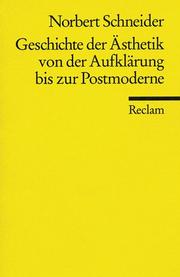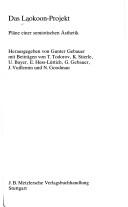| Listing 1 - 10 of 76 | << page >> |
Sort by
|

ISBN: 3150094577 9783150094570 Year: 1996 Publisher: Stuttgart: Reclam,
Abstract | Keywords | Export | Availability | Bookmark
 Loading...
Loading...Choose an application
- Reference Manager
- EndNote
- RefWorks (Direct export to RefWorks)
Book
ISBN: 1443868345 9781443868341 9781443868341 Year: 2014 Publisher: Newcastle upon Tyne, [England] : Cambridge Scholars Publishing,
Abstract | Keywords | Export | Availability | Bookmark
 Loading...
Loading...Choose an application
- Reference Manager
- EndNote
- RefWorks (Direct export to RefWorks)
As a new trend in aesthetics appearing concurrently in the West and the East in the last ten years, the aesthetics of everyday life points to a growing diversification among existing methodologies for pursuing aesthetics, alongside the shift from art-based aesthetics. The cultural diversity manifest in global aesthetics offers common ground for the collaborative efforts of aesthetics in both the West and the East. Given the rapidly growing interest and its potential for attracting new audienc...
Aesthetics, Modern --- Modern aesthetics --- Aesthetics --- History. --- History

ISBN: 3476005356 Year: 1984 Publisher: Stuttgart Metzler
Abstract | Keywords | Export | Availability | Bookmark
 Loading...
Loading...Choose an application
- Reference Manager
- EndNote
- RefWorks (Direct export to RefWorks)
Aesthetics --- Semiotics --- Aesthetics, Modern --- -Semiotics --- -Semeiotics --- Semiology (Linguistics) --- Semantics --- Signs and symbols --- Structuralism (Literary analysis) --- Modern aesthetics --- History --- -Lessing, Gotthold Ephraim --- -History --- -Modern aesthetics --- Semeiotics --- Lessing, Gotthold Ephraim,
Book
ISBN: 3772017657 Year: 1991 Volume: 1590 Publisher: Tübingen Francke
Abstract | Keywords | Export | Availability | Bookmark
 Loading...
Loading...Choose an application
- Reference Manager
- EndNote
- RefWorks (Direct export to RefWorks)
Aesthetics, Modern --- Literature --- Esthétique moderne --- Littérature --- Aesthetics --- Esthétique --- Esthétique moderne --- Modern aesthetics --- -Esthetica --- -Modern aesthetics --- 82.01 --- Belles-lettres --- Western literature (Western countries) --- World literature --- 82.01 Esthetica --- Esthetica --- Aesthetics. --- ESTHETIQUE --- LITTERATURE
Multi
ISBN: 9781107643222 9781107038035 9781107038042 9781107038059 1107643228 1107038030 1107038049 1107038057 9781107110342 1107110343 Year: 2014 Publisher: New York, N.Y. Cambridge University Press
Abstract | Keywords | Export | Availability | Bookmark
 Loading...
Loading...Choose an application
- Reference Manager
- EndNote
- RefWorks (Direct export to RefWorks)
A History of Modern Aesthetics narrates the history of philosophical aesthetics from the beginning of the eighteenth century through the twentieth century. Aesthetics began with Aristotle's defense of the cognitive value of tragedy in response to Plato's famous attack on the arts in The Republic, and cognitivist accounts of aesthetic experience have been central to the field ever since. But in the eighteenth century, two new ideas were introduced: that aesthetic experience is important because of emotional impact - precisely what Plato criticized - and because it is a pleasurable free play of many or all of our mental powers. This book tells how these ideas have been synthesized or separated by both the best-known and lesser-known aestheticians of modern times, focusing on Britain, France and Germany in the eighteenth century; Germany and Britain in the nineteenth; and Germany, Britain and the United States in the twentieth.
Aesthetics --- anno 1700-1799 --- anno 1800-1999 --- Aesthetics, Modern --- Aesthetics, Modern. --- PHILOSOPHY --- History. --- History & Surveys --- Modern. --- Modern aesthetics --- History --- Philosophy

ISBN: 3788502827 9783788502829 Year: 1985 Publisher: Pfullingen Neske
Abstract | Keywords | Export | Availability | Bookmark
 Loading...
Loading...Choose an application
- Reference Manager
- EndNote
- RefWorks (Direct export to RefWorks)
Book
ISBN: 3110299577 3110299585 9783110299571 3110217805 9783110217803 9783110299304 3110299305 Year: 2012 Publisher: Berlin De Gruyter
Abstract | Keywords | Export | Availability | Bookmark
 Loading...
Loading...Choose an application
- Reference Manager
- EndNote
- RefWorks (Direct export to RefWorks)
Das im späten 18. Jahrhundert entstandene Konzept einer 'Kunstreligion' radikalisiert sich nach 1850 im Horizont einer ästhetischen 'Moderne'. Die autonom gewordene Kunst übernimmt Aufgaben und Funktionen, die zuvor Sache der Religion gewesen sind, und stilisiert z. B. den Künstler als Priester oder als Prophet.Die Beiträge rekonstruieren in Fallstudien von Richard Wagner und Theodor Storm über Hugo von Hofmannsthal und Stefan George bis zu Max Reinhardt und Martin Heidegger unterschiedliche Erscheinungsformen einer Kunstauffassung, die sich des quasi numinosen Charakters ihrer Werke bewusst geworden ist und diese Analogie produktiv macht.Es eröffnen sich neue und differenzierte, synchrone wie diachrone, zugleich medienspezifische und medienübergreifende Perspektiven auf ein für die Moderne wie für die Postmoderne gleichermaßen wichtiges Kulturphänomen.
Religion and literature --- Aesthetics, Modern. --- German literature --- Modern aesthetics --- Literature --- Literature and religion --- Moral and religious aspects --- Poetics. --- aesthetics. --- moderism.
Book
ISBN: 3110433001 3110434784 9783110433005 3110427095 9783110427097 9783110434781 9783110427097 3110427095 Year: 2015 Publisher: Berlin Boston
Abstract | Keywords | Export | Availability | Bookmark
 Loading...
Loading...Choose an application
- Reference Manager
- EndNote
- RefWorks (Direct export to RefWorks)
Utopian hope and dystopian despair are characteristic features of modernism and the avant-garde. Readings of the avant-garde have frequently sought to identify utopian moments coded in its works and activities as optimistic signs of a possible future social life, or as the attempt to preserve hope against the closure of an emergent dystopian present. The fourth volume of the EAM series, European Avant-Garde and Modernism Studies, casts light on the history, theory and actuality of the utopian and dystopian strands which run through European modernism and the avant-garde from the late 19th to the 21st century. The book's varied and carefully selected contributions, written by experts from around 20 countries, seek to answer such questions as: · how have modernism and the avant-garde responded to historical circumstance in mapping the form of possible futures for humanity?· how have avant-garde and modernist works presented ideals of living as alternatives to the present?· how have avant-gardists acted with or against the state to remodel human life or to resist the instrumental reduction of life by administration and industrialisation?
Arts, European --- Aesthetics, Modern --- Utopias in art. --- Modern aesthetics --- European arts --- Themes, motives. --- Utopia. --- avant-garde. --- modernism.
Book
ISBN: 9783839462027 3839462029 Year: 2022 Publisher: Bielefeld
Abstract | Keywords | Export | Availability | Bookmark
 Loading...
Loading...Choose an application
- Reference Manager
- EndNote
- RefWorks (Direct export to RefWorks)
In American visual culture, the 1930s and 1940s were a key transitional period shaped by the era of modernism and the global confrontation of World War II. Christof Decker demonstrates that the war and its iconography of destruction challenged visual artists to find new ways of representing its consequences. Dealing with trauma and war crimes led to the emergence of complex aesthetic forms and media crossovers. Decker shows that the 1940s were a pivotal period for the creation of horrific yet also innovative representations that boosted American visual modernism and set the stage for debates about the ethics of visual culture in the post-9/11 era.
Aesthetics, Modern. --- Modern aesthetics --- America. --- American Studies. --- Cultural Studies. --- Image. --- Media. --- Photography. --- USA. --- Visual Culture. --- Visual Studies. --- World War II.

ISBN: 0804727309 0804727295 9780804727303 Year: 1997 Publisher: Stanford (Calif.): Stanford university press
Abstract | Keywords | Export | Availability | Bookmark
 Loading...
Loading...Choose an application
- Reference Manager
- EndNote
- RefWorks (Direct export to RefWorks)
Political science --- Aesthetics, Modern. --- Philosophy. --- Aesthetics, Modern --- 321.01 --- Political philosophy --- Modern aesthetics --- Philosophy --- Democracy --- Science politique --- Esthétique moderne --- Démocratie --- Philosophie --- Political science - Philosophy.
| Listing 1 - 10 of 76 | << page >> |
Sort by
|

 Search
Search Feedback
Feedback About UniCat
About UniCat  Help
Help News
News